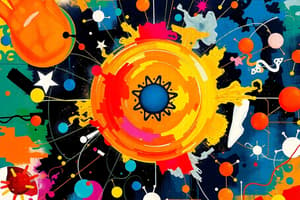Podcast
Questions and Answers
What is a hypothesis in scientific terms?
What is a hypothesis in scientific terms?
- A testable prediction based on observations. (correct)
- A definitive conclusion based on multiple experiments.
- A theory that has been disproved.
- An established law of nature.
Which of these best defines a theory in science?
Which of these best defines a theory in science?
- A well-substantiated explanation based on evidence. (correct)
- A prediction made for a specific experiment.
- An unproven guess about the natural world.
- A simple statement about observable phenomena.
What is the first step in the scientific method?
What is the first step in the scientific method?
- Experiment
- Analysis
- Conclusion
- Question (correct)
Which branch of science focuses on human behavior and societies?
Which branch of science focuses on human behavior and societies?
What role does science play in global challenges?
What role does science play in global challenges?
What is one ethical consideration in scientific research?
What is one ethical consideration in scientific research?
How does effective science communication benefit society?
How does effective science communication benefit society?
What is a law in scientific terminology?
What is a law in scientific terminology?
Which of the following is NOT a step in the scientific method?
Which of the following is NOT a step in the scientific method?
What is the primary aim of science?
What is the primary aim of science?
Study Notes
Definition of Science
- Systematic study of the natural world through observation and experimentation.
- Aims to understand and explain phenomena.
Key Concepts in Science
-
Hypothesis
- A testable prediction based on observations.
-
Theory
- A well-substantiated explanation of some aspect of the natural world, based on a body of evidence.
-
Law
- A statement that describes an observable phenomenon; often expressed mathematically (e.g., Newton's laws of motion).
Scientific Method
- A systematic approach to research.
-
Question
- Identify what you want to learn about.
-
Research
- Gather existing information related to the question.
-
Hypothesis
- Propose a tentative explanation or answer to the question.
-
Experiment
- Conduct tests to validate or invalidate the hypothesis.
-
Analysis
- Examine data collected during experiments.
-
Conclusion
- Summarize findings and determine if the hypothesis was supported or not.
Branches of Science
-
Natural Sciences
- Study of natural phenomena (e.g., physics, chemistry, biology).
-
Social Sciences
- Study of human behavior and societies (e.g., psychology, sociology, economics).
-
Formal Sciences
- Study of abstract concepts (e.g., mathematics, logic).
-
Applied Sciences
- Practical applications of scientific knowledge (e.g., engineering, medicine).
Importance of Science
- Enhances understanding of the world.
- Drives technological advances.
- Informs policy and decision-making.
- Contributes to solving global challenges (e.g., climate change, health).
Ethical Considerations in Science
- Responsibility for the societal impact of scientific research.
- Importance of integrity, transparency, and reproducibility in scientific findings.
- Ethical implications of experiments, particularly involving human and animal subjects.
Science Communication
- Essential for public understanding of scientific concepts.
- Engages community in scientific issues and decisions.
- Effective communication fosters trust in scientific research.
Definition of Science
- Science is the systematic study of the natural world
- Scientists use observation and experimentation to understand and explain natural phenomena
Key Concepts in Science
- A hypothesis is a testable prediction based on observations
- A theory is a well-substantiated explanation of some aspect of the natural world, based on a body of evidence
- A law is a statement that describes an observable phenomenon, often expressed mathematically (e.g., Newton's laws of motion)
Scientific Method
- The scientific method is a systematic approach to research
- It involves asking a question, gathering research, forming a hypothesis, conducting experiments, analyzing data, and drawing conclusions
Branches of Science
- Natural sciences study natural phenomena (e.g., physics, chemistry, biology)
- Social sciences study human behavior and societies (e.g., psychology, sociology, economics)
- Formal sciences study abstract concepts (e.g., mathematics, logic)
- Applied sciences focus on practical applications of scientific knowledge (e.g., engineering, medicine)
Importance of Science
- Science enhances our understanding of the world
- It drives technological advances
- It informs policy and decision-making
- It contributes to solving global challenges (e.g., climate change, health)
Ethical Considerations in Science
- Scientists must consider the societal impact of their research
- Scientific research requires integrity, transparency, and reproducibility
- It's important to consider the ethical implications of experiments, particularly involving human and animal subjects
Science Communication
- Effective science communication is crucial for public understanding of scientific concepts
- It engages the community in scientific issues and decisions
- Good communication fosters trust in scientific research
Studying That Suits You
Use AI to generate personalized quizzes and flashcards to suit your learning preferences.
Description
This quiz explores key concepts in science, including definitions, the scientific method, and the distinctions between hypotheses, theories, and laws. Test your understanding of how scientific knowledge is structured and the processes involved in scientific inquiry.




